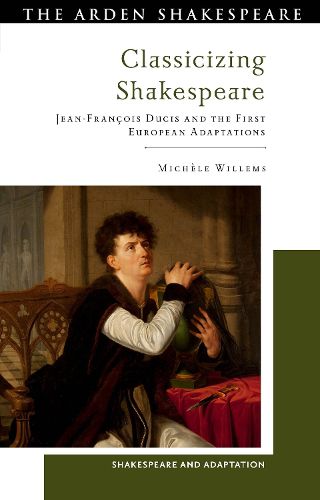Readings Newsletter
Become a Readings Member to make your shopping experience even easier.
Sign in or sign up for free!
You’re not far away from qualifying for FREE standard shipping within Australia
You’ve qualified for FREE standard shipping within Australia
The cart is loading…






This book explores the nature and wide-ranging impact of the work of Jean-Francois Ducis (1733-1816), the first adaptor of Hamlet and of five other Shakespeare tragedies for the French theatre.
Jean-Francois Ducis is anything but prominent in the histories of Shakespeare adaptation, yet he was pivotal in introducing French and European audiences to Shakespeare's plays on the stage. His Hamlet, tragedie imitee de l'anglais, performed at the Comedie francaise in 1769, was the first representation of a Shakespeare play on a French stage and was still performed in 1851. Despite his total ignorance of English, Ducis also adapted Romeo and Juliet, Macbeth, King Lear, King John and Othello, playswhich were then translated, like his Hamlet, into a number of European languages.
Classicizing Shakespeare studies Ducis's Shakespearean corpusin the context of the neoclassical climate which, a century earlier, had set off a wave of adaptations in England. Within the wider picture of the European representation of Shakespeare on the stage from 1660 to 1850, the study of Ducis's emblematic case sheds further light on the rationale of these English adaptations as well as on the reception of Shakespeare's plays in most Continental countries well into the 19th century. Willems' rich contextual study demonstrates why the translations of Ducis's own 'imitations' were instrumental in exporting Shakespeare all over the Continent. Through attention to the professional relationship with the renowned actor, Francois-Joseph Talma, Classicizing Shakespeare reveals too how collaborative practices in the theatre impact on the evolution of a text.
$9.00 standard shipping within Australia
FREE standard shipping within Australia for orders over $100.00
Express & International shipping calculated at checkout
Stock availability can be subject to change without notice. We recommend calling the shop or contacting our online team to check availability of low stock items. Please see our Shopping Online page for more details.
This book explores the nature and wide-ranging impact of the work of Jean-Francois Ducis (1733-1816), the first adaptor of Hamlet and of five other Shakespeare tragedies for the French theatre.
Jean-Francois Ducis is anything but prominent in the histories of Shakespeare adaptation, yet he was pivotal in introducing French and European audiences to Shakespeare's plays on the stage. His Hamlet, tragedie imitee de l'anglais, performed at the Comedie francaise in 1769, was the first representation of a Shakespeare play on a French stage and was still performed in 1851. Despite his total ignorance of English, Ducis also adapted Romeo and Juliet, Macbeth, King Lear, King John and Othello, playswhich were then translated, like his Hamlet, into a number of European languages.
Classicizing Shakespeare studies Ducis's Shakespearean corpusin the context of the neoclassical climate which, a century earlier, had set off a wave of adaptations in England. Within the wider picture of the European representation of Shakespeare on the stage from 1660 to 1850, the study of Ducis's emblematic case sheds further light on the rationale of these English adaptations as well as on the reception of Shakespeare's plays in most Continental countries well into the 19th century. Willems' rich contextual study demonstrates why the translations of Ducis's own 'imitations' were instrumental in exporting Shakespeare all over the Continent. Through attention to the professional relationship with the renowned actor, Francois-Joseph Talma, Classicizing Shakespeare reveals too how collaborative practices in the theatre impact on the evolution of a text.